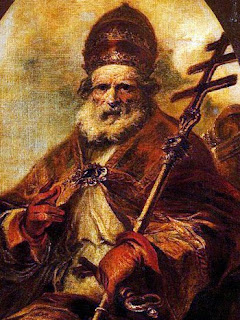Here is something more from Pope Leo the Great ( c. 400 – 10 November 461) on the two natures of Jesus -- that Jesus is both God and man. (For a longer introduction on the significance of this teaching and the attack against Christianity which prompted Leo's letter, see this blog entry.)
 |
| Pope Leo the Great |
After the Council of Chalcedon (451 AD), Pope Leo wrote a letter to Flavian, bishop of Constantinople, regarding Eutyches who had been teaching that Jesus was not really a man, but bore only the form or appearance of a man. What Pope Leo writes is the correct teaching of the Scripture and the faithful confession of the Church.
It is a mystery worth pondering, especially as we are coming up on the celebration of the incarnation of our Lord, better known as Christmas.
Here is another portion of Leo's letter:
"There is nothing unreal about this oneness, since both the lowliness of the man and the grandeur of the divinity are in mutual relation. As God is not changed by showing mercy, neither is humanity devoured by the dignity received. The activity of each form is what is proper to it in communion with the other: that is, the Word performs what belongs to the Word, and the flesh accomplishes what belongs to the flesh. One of these performs brilliant miracles the other sustains acts of violence. As the Word does not lose its glory which is equal to that of the Father, so neither does the flesh leave the nature of its kind behind. We must say this again and again: one and the same is truly Son of God and truly son of man. God, by the fact that in the beginning was the Word, and the Word was with God, and the Word was God; man, by the fact that the Word was made flesh and dwelt among us. God, by the fact that all things were made through him, and nothing was made without him, man, by the fact that he was made of a woman, made under the law. The birth of flesh reveals human nature; birth from a virgin is a proof of divine power. A lowly cradle manifests the infancy of the child; angels’ voices announce the greatness of the most High. Herod evilly strives to kill one who was like a human being at the earliest stage the Magi rejoice to adore on bended knee one who is the Lord of all. And when he came to be baptised by his precursor John, the Father’s voice spoke thunder from heaven, to ensure that he did not go unnoticed because the divinity was concealed by the veil of flesh: This is my beloved Son, in whom I am well pleased. Accordingly, the same one whom the devil craftily tempts as a man, the angels dutifully wait on as God. Hunger, thirst, weariness, sleep are patently human. But to satisfy five thousand people with five loaves; to dispense living water to the Samaritan woman, a drink of which will stop her being thirsty ever again; to walk on the surface of the sea with feet that do not sink; to rebuke the storm and level the mounting waves; there can be no doubt these are divine."
Source: http://www.papalencyclicals.net/councils/ecum04.htm

No comments:
Post a Comment
Due to recurring spam, all comments will now be moderated. Please be patient.